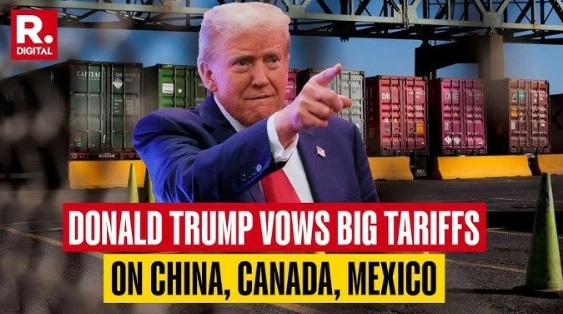
President Trump on Saturday moved to impose stiff tariffs on Mexico and Canada, whose leaders swiftly responded with their own levies and accused Mr. Trump of starting a trade war that would debilitate all three economies, writes ‘The New York Times’.
Mr. Trump hit Canada and Mexico with tariffs of 25 percent on all goods, with a partial carve out for Canadian energy and oil exports. He said he was imposing them until the flow of migrants and illegal fentanyl into the United States was alleviated, but his administration did little to explain what further steps were needed to remove the tariffs.
The tariffs announced Saturday also placed a 10 percent tariff on goods from China, another major U.S. trading partner. China’s Ministry of Commerce issued a statement saying that China will file a legal case against the United States at the World Trade Organization.
The ministry also said China “will take corresponding countermeasures to firmly safeguard its rights and interests.” But it did not mention tariffs or otherwise specify other steps. China has strong incentives to avoid a trade war, but also risks looking weak domestically if it does not retaliate.
The responses from Mexico and Canada to the levies — set to go into effect on Tuesday — were swift.
President Claudia Sheinbaum of Mexico responded with a statement on social media that pushed back on Mr. Trump’s criticism. She described U.S. suggestions that her government collaborates with drug traffickers as “slander.” She also called on the U.S. to curb its domestic demand for drugs, and proposed more bilateral collaboration on the issue.
Ms. Sheinbaum added that Mexico would implement “tariff and non-tariff measures in defense of Mexico’s interests.” But she did not elaborate, and the potential scope of Mexico’s retaliation was not immediately clear.
Products from Mexico, China and Canada accounted for more than 40 percent of all goods that come into the United States. The three countries provide cars, medicine, shoes, timber, electronics, steel and many other products to American consumers. Mr. Trump and other White House officials have deflected criticism that the tariffs will add to inflation.
China’s foreign ministry on Sunday issued a strong defense of its country’s record on fentanyl, saying that China had led the world in 2019 when it imposed stringent regulations on fentanyl-related substances. “Fentanyl is an issue for the U.S.,” the Ministry of Foreign Affairs said, while also criticizing the American decision to impose tariffs.
Prime Minister Justin Trudeau of Canada laid out more than $100 billion in retaliatory tariffs against the United States late Saturday, in a forceful response to President Trump’s decision to impose levies on a range of Canadian goods. But he made clear that Canada was doing so reluctantly.
“We don’t want to be here,” Mr. Trudeau said in a somber televised address from Ottawa that evoked the deep bonds between the two neighbors and close trading partners. “We didn’t ask for this.”
Mr. Trudeau spoke hours after President Trump hit Canada and Mexico with tariffs of 25 percent on all goods, with a partial carve out for Canadian energy and oil exports. Mr. Trudeau said that Canada would swiftly impose its own “far-reaching” retaliatory tariffs of 25 percent on 155 billion Canadian dollars ($106 billion) worth of U.S. goods.
Initial tariffs worth 30 billion Canadian dollars will start on Tuesday, when the U.S. tariffs go into effect, Mr. Trudeau said. That will be followed by tariffs on 125 billion Canadian dollars worth of goods in the next three weeks, a delay he said would allow Canadian businesses to prepare.
Before Mr. Trudeau’s prime-time address, Canada had indicated that it would tax Florida orange juice, Tennessee whiskey and Kentucky peanut butter — products from states with Republican senators. Mr. Trudeau said on Saturday night that Canada’s tariff list would also include products like beer, wine, vegetables, perfume, clothing, shoes, household appliances, furniture and sports equipment, and materials like lumber and plastics.
He added that more measures were being considered, including curbing or taxing energy exports that the United States relies on.
Mr. Trudeau addressed Americans directly, saying that the U.S. tariffs on Canadian goods would harm them, too.
“This is a choice that, yes, will harm Canadians, but beyond that, it will have real consequences for you, the American people,” he said. “As I have consistently said, tariffs against Canada will put your jobs at risk, potentially shutting down American auto assembly plants and other manufacturing facilities.”
Mr. Trudeau expressed regret that the two nations, as well as Mexico — all signatories to a free-trade agreement — now find themselves in a trade war that will upend the flow of goods across North America.
Mr. Trudeau is a lame-duck leader at a crucial moment. He has said that he will resign as prime minister and leader of the Liberal Party when his party chooses a new leader, and automatically prime minister, in March. But experts believe the tariffs that take effect on Tuesday will tip the country into a recession, putting hundreds of thousands of jobs at risk.
read more in our Telegram-channel https://t.me/The_International_Affairs

 11:56 04.02.2025 •
11:56 04.02.2025 •






















